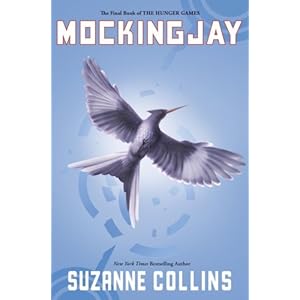 Mockingjay wasn't quite what I expected from the final third of this admittedly thrilling young adult fantasy trilogy. The first two books walked a delicate line between the somewhat conventional and the surprisingly fresh, or - maybe more pertinent - between the commercial and the avant garde. They were age appropriate and wholly familiar in their tropes, yet at the same time flirted with meta-narrative, containing nuanced examinations of friendship, loyalty, and attraction. They were satisfying on nearly every level.
Mockingjay wasn't quite what I expected from the final third of this admittedly thrilling young adult fantasy trilogy. The first two books walked a delicate line between the somewhat conventional and the surprisingly fresh, or - maybe more pertinent - between the commercial and the avant garde. They were age appropriate and wholly familiar in their tropes, yet at the same time flirted with meta-narrative, containing nuanced examinations of friendship, loyalty, and attraction. They were satisfying on nearly every level.Mockingjay is not nearly so satisfying, but that doesn't necessarily make it a bad book. In fact, I would go so far as to say that it's probably a better book, both for its refusal to pander to the reader's expectations and for its more willing embrace of the less commercial aspects of its predecessors. I came to Mockingjay (as I did with the Hunger Games trilogy in general) hoping to be titillated by good dystopic world building and pre-teen romance, and while the world building and romance are still there in flashes, Collins seems to have another goal in mind as she wraps up her trilogy.
The main characters are back: Katniss, still surly and fiercely independent, resisting the attempts of the rebels to make her their "Mockingjay," the symbol of the rebellion; her childhood friend Gale; other Hunger Games alumnae; and of course the irrepressible Haymitch, Katniss' Hunger Games mentor. The situation has changed, however - the Hunger Games have broken and given way to full-on rebellion. Katniss and her crew are housed in the long-forgotten District 13, a technologically advanced and draconian society, which is the breeding ground for the rebellion rising in the other districts. And while the power brokers from the previous books are off plotting in the distant Capitol, Collins gives us a whole new set of politicians and bureaucrats to mistrust - President Coin, of District 13, foremost among them.
Mockingjay is hung on a much looser frame than its predecessors. Kanitss must become the Mockingjay; the rebellion must go forward; they must rescue Peeta and the other captured Hunger Games tributes; they must advance on the Capitol and assassinate evil President Snow. It's much less a plot and much more a collection of sequential events, clustered around Katniss. To be honest, it's a disaster of a plot - linear and yet schizophrenic, dependent much less on a series of causes and effects and much more on some predetermined sequence of events. The previous books allow Katniss some agency once she enters the arenas of the Hunger Games; Mockingjay removes it from her almost completely. Although she manages to wrest some control during the fleeting scenes of battle scattered throughout the novel, and especially towards the end, Katniss is oppressively controlled through most of the novel, and it is this lack of agency that affects both the character and the plot.
Mockingjay could be a hot mess, a scatter-brained conclusion to a previously tight and controlled series; it could also be genius.
The more I think about it, the more convinced I am that Collins, with this novel, has created an affecting picture of post-traumatic stress disorder and its effects. There's not a single character who isn't deeply scarred by the ordeals faced in the Hunger Games, not the least of whom is Katniss, who moves through much of the book in a kind of rage-induced haze. When I found myself concerned that Collins seemed to be skirting over the more essential actions of the rebellion, giving us reports without putting us in the action, so to speak, I realized that we are, like it or not, pretty firmly stuck in Katniss' point of view, and the alienation the saturates the novel is simply a manifestation of Katniss' own alienation. Katniss is, in effect, Harry Potter if Harry Potter had been written in absolute truthfulness - by this third novel, she is irreparably damaged by her ordeals.
Mockingjay is anarchic, distrustful, violent, and deeply unsettling. Katniss does get the boy in the end (though I won't say which one), but the "getting" is complicated and dogged with memories of trauma. It's ultimately unfulfilling, but I'm pretty sure that's beyond the point. Mockingjay wants to do more than fulfill.
No comments:
Post a Comment